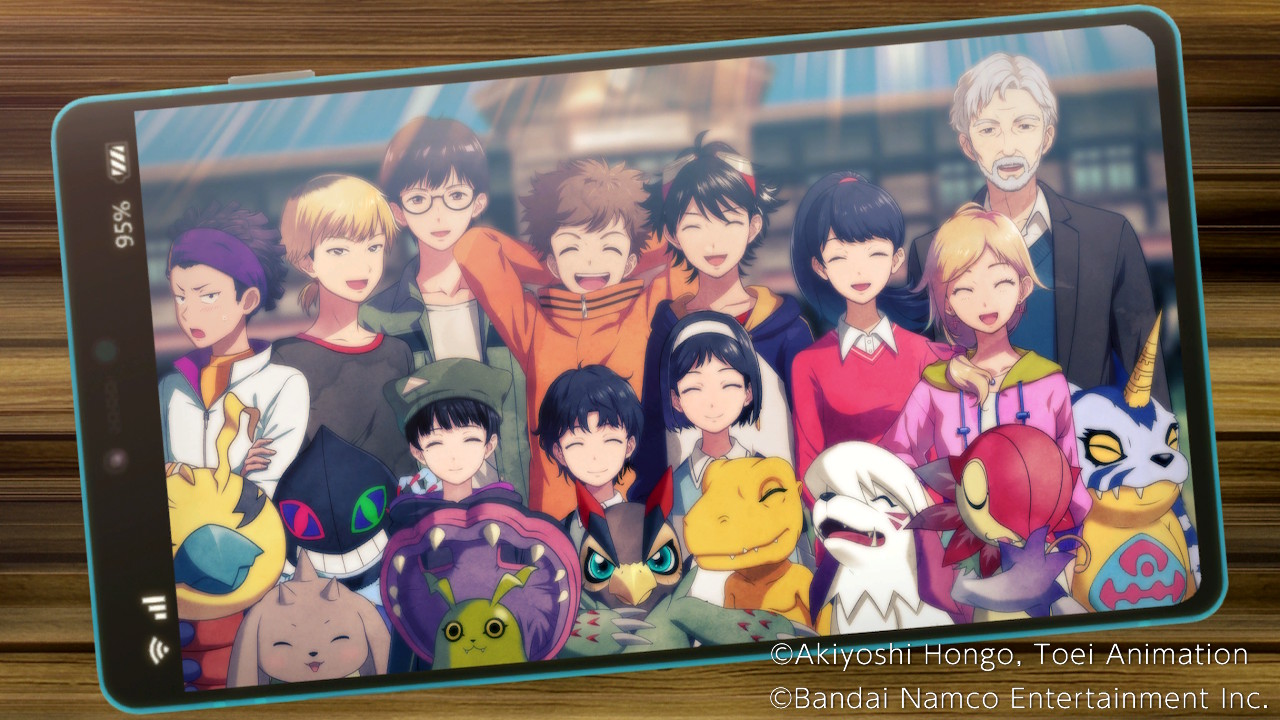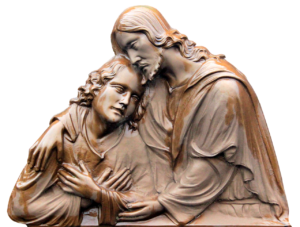Audio accessibility for this blog post is powered by Microsoft Text-to-Speech technology. These recordings are provided for personal, non-commercial educational use only.
Since January of 2021, my love for the Digimon Franchise was rekindled and has been burning brightly and consistently ever since. It started with deciding to watch the Digimon Adventure Tri movies and Last Evolution Kizuna. After that, I rewatched all the anime episodes, including the newer series like Adventure 2020 and Digimon Ghost Game which, as the time of this writing, still hasn’t concluded. I also played the more recent Digimon Games such as Digimon Story: Cyber Sleuth and Digimon Story: Cyber Sleuth: Hacker’s Memory, which are AMAZING games! I even went so far as to write sequels to a Digimon FDD that me and some online friends wrote together in 2006; all of which can be read at www.DigimonUniverseFDD.com
So, I was as psyched as everyone else in the fandom when the most recent game, Digimon Survive, was released. As a Nintendo person, I downloaded the Switch version from the Nintendo E-Shop.
A Little Bit About The Game
This game is a visual novel with tactical RPG elements, meaning it’s heavily story driven. Moreover, this game doesn’t just have one story; it technically has multiple stories. It has multiple timelines the player can go through based on the choices they make in the game. Wrong decisions can even result in some of the Digidestined children getting killed! As such, your goal as the player isn’t merely to defeat the bad guys, but it’s to make sure as many of your friends make it back home to their families as possible. Everyone, if it’s feasible.
And if you know what you’re doing, you can pull that off. To get the good ending where everyone lives, there are several things you need to do. For one thing, make as many “Moral” choices as possible.
Oftentimes, in the game you’ll be presented with dialogue choices categorizes as “Moral”, “Harmonious”, and “Wrathful”. These can affect story progression as well as the types of Digimon you can befriend in “Free Battles”. A second thing to ensure everyone’s survival is to boost “Affinity” with as many of the characters as possible. As the character Takuma, you’re the one who dons the goggles and are therefore the leader of the group. You’ll oftentimes find yourself needing to encourage or lift up other characters, or defuse a heated argument in the group. Depending on which of three dialogue options you choose, you’ll either boost Affinity, tick the character off, or nothing at all will happen. There’s a good, bad, and neutral outcome.
If you have knowledge of how a character would respond depending on which dialogue option you choose, you can get the character to “freely” choose to bond with Takuma and make better decisions that are more conducive to survival. And if you know the essences of the characters completely, then you can always choose to say what they need to hear without mistakes! It isn’t impossible to do this as video game walkthroughs are a thing, so as the player, you CAN know which affinity boosting dialogue option is the one to choose, and you can also know which one is a “Moral”, “Wrathful”, or “Harmonious” dialogue option. The latter usually don’t have anything to do with boosting affinity, but with story progression.
And if you’re a benevolent person who wants to see as many of the characters survive as possible, you will actualize a playthrough where all of the characters do as you want them do (without determining them) and, lo and behold, you get the “true ending” of the game.
I had to play through this game twice as half of the kids died on my first playthrough! It was an extremely dark and bleak story, especially considering that this is a Digimon game! But on the second playthrough, I was much more consiencous of my choices and I strove for the good ending. The ending of my first playthrough left a bad taste in my mouth. The deaths near the end of that playthrough were especially hard to stomach as I had become emotionally invested in those characters after so many hours.
God’s Salvific Providence – A Brief Overview
In my writings and videos The Problem of Hell, I argue that God loves all people (John 3:16), wants all people to be saved (2 Peter 3:9, 1 Timothy 2:4), and does everything He can to get people saved – such as dying for their sins (1 Timothy 2:6, 1 John 2:2, Hebrews 2:9) and sending grace to enable and persuade people to repent (John 12:32) – but will not override their libertarian free will. God’s grace is resistible (Acts 7:51) and He will not coerce, force, or “irresistibly change the will” of anyone to ensure their salvation. In those aforementioned articles and videos, I argue that libertarian free will is necessary for love to be true and genuine. God could force people to love Him and each other. God could force people to do the right thing 100% of the time. But if he did that, all otherwise praiseworthy actions would be meaningless, and “love” would be an artificial making. I often use the illustration of a man going to “Robo Depot” in a futuristic society to get a robot woman who looks and behaves identical to a real human woman, and who is programmed to do lots of loving actions that please her husband. The husband comes to realize that all of her kind acts, gentle words, and loyalty are really just his own love for himself reflected back to him. He isn’t really receiving genuine love from another person at all. It’s not meaningful to him because the robot woman cannot do otherwise. She cannot do anything but follow her programming. It would only be meaningful if she were the source of her own loving actions and if she had the ability to choose otherwise. This is why God will not override free will to make a world of only good people or a world where everyone is saved. To create such a world, God would have to create a world where love does not exist.
All people are sinners (Psalm 14:2-4, Romans 3:23) and are therefore worthy of the wages of sin, which is death (Romans 6:23) which Matthew 10:28 tells us is a death of body and soul in a place called Hell. And as a just and righteous God, God cannot simply turn a blind eye to sin. Rather, he became human and took on the penalty on Himself (John 1:14, Philippians 2:5-8, 2 Corinthians 5:21). Jesus died on the cross in a brutal way to suffer the penalty of sin on our behalf. All we need to do is to turn to Him, confess and repent of our sins, and ask Him to be our Savior. And God does everything He can to bring as many people as possible into His Kingdom freely, but He will stop short at forcing people.
My Playthrough Of Digimon Survive As An Analogy
There’s another aspect of this though, and this where Digimon Survive serves as an interesting analogy. As a Molinist, I propose that God has what Molinist theologians call “Middle Knowledge”. It is called this because it is in the “middle” logically speaking, between two other logical moments of God’s knowledge; God’s Natural Knowledge and God’s Free Knowledge. God’s Natural Knowledge is His knowledge of all logical possibilities and necessities. Regarding human choices, God knows everything you could freely choose to do. Logically posterior to God’s knowledge of all things that could happen are all things that would happen under various circumstances. For example, “If Judas is born in the first century, he would freely choose to betray Jesus over to the Sanhedrin.”, “If Pilate were the procurator of the first century, he would freely choose to hand Jesus over to be crucified”, and so on. God knows all logically possible states of affairs. He knows all exaustive lists of possible statements and all lists of true counterfactuals. Philosophers call such lists of logically possible statements “Possible Worlds”. They call such exhaustive lists of counterfactual statements (especially as they pertain to counterfactuals of creaturely freedom) “Feasible Worlds”. The difference between a possible world and a feasible world is not difficult to explain; a world in which The Apostle Peter freely chooses NOT to deny Jesus 3 times before the rooster crows is a possible world. There is a logically coherent conjunction of statements which includes the statement “Peter chooses not to deny Jesus 3 times before the rooster crows”. Nevertheless, because Peter has libertarian free will, it may not be feasible for God to actualize a world in which Peter is found in those circumstances and, thus, chooses not to deny Jesus. If God actualizes a world in which Peter is badgered by those in the courtyard, if Peter would freely choose to deny Christ, that is the choice that Peter will make. And there’s nothing God can do (without abriding Peter’s freedom anyway) to get Peter to choose otherwise. So, despite such a world being possible, it’s not feasible for God to bring such a world about due to the choice Peter would make in that circumstance. Of course, God is omnipotent and could force Peter to affirm Christ in that circumstance, but then we’d have another feasible world entirely. It would not be the world where Peter FREELY chooses not to deny Christ. It would be a world in which Peter is causally determined not to deny Christ.
Molinism is an extremely fruitful view because it permits one to say that God can orchestrate events in the world while preserving human freedom. We are able to affirm along with our Calvinist brothers that God is in control over everything down to the most minute detail, and thus we have a high view of sovereignty. Yet we can also affirm along with Arminians and Open Theists that humans are genuinely free, have the ability to choose otherwise, and are truly responsible for our actions.
Let’s take the crucifixion of Jesus as an example. The Bible says “This man [Jesus] was handed over to you by God’s deliberate plan and foreknowledge; and you, with the help of wicked men, put him to death by nailing him to the cross.” (Acts 2:23, emphasis mine). The crucifixion of Jesus was deliberately planned by God, His foreknowledge played a role in the matter, but it was wicked men who put Jesus to the cross. Molinists say that God knew that if Caiaphas was high priest in the first century, then he would freely condemn Jesus on grounds of blasphemy and he would freely take Him to Pilate for execution. He knew that if Pilate was prefect in the first century, then he would freely comply with the demands of the crowd. And God knew that if Judas was born in the time and place that he actually was, then he would become Jesus’ disciple for a while and would freely choose to betray Jesus to the Sanhedrin. God knew how all of these people would behave if He placed them in the time and places He did. God decreed the whole thing, but the libertarian freedom of the actors remained completely intact.
Letting Molinsm inform our soteriology, we can say that God knows just what circumstances are sufficient to prompt a free and positive response to the gospel. And so, God can orchestrate the world in such a way that those who would freely respond if X, or if Y, or if Z were the case, people find themselves in just those circumstances, and people respond to the gospel just as God knew they would.
It’s as if the whole of human history is a game of spiritual survival, and God, the player, has to make choices on how to interact with His creatures if He is to have the most optimal result. Just as I was not willing that any of the Digidestined should fall at the hands of the Kenzoku and Takuma’s enemy “The Master”, so God is not willing that humans should fall at the hands His enemy, Satan. God makes “dialogue choices” knowing how His creatures will respond. He even chooses the contents of scripture – ALL of scripture, down to the very words chosen – this is a view called “Verbal Plenary Inspiration” and would take us too far afield to dive into here. God chooses what circumstances we find ourselves in knowing in advance how we would respond if we found ourselves in these circumstances. He chooses when and where people are born, what prayers he chooses to answer or not answer, how long people will physically be alive, and so on. Everything that occurs in the actual world was factored in by God in His decision of which of the many feasible worlds to actualize.
Likewise, there wasn’t a single dialogue option I didn’t take into acount in trying to actualize an entire playhrough. I decided who to talk to, when, and how much Affinity was needed to ensure their survival.
But it wasn’t merely my interaction with the non-player characters that made a difference in who survived. As I played through the game, I realized that preventing the very first death (that of Ryo and his Kunemon), that would prevent two other deaths in the game which WOULD have been inevitable IF Ryo had not survived. In the same way, it is not merely God’s interactions with us that matter, but our interactions with each other also have an impact on which possible/feasible world is actual.
If Ryo had not survived, Shuuji would have let his self loathing and insecurities get to him, leading him to project his weakness onto Lopmon, abuse Lopmon, and lead to his Dark Digivolution into Wendigomon. And if Lopmon Dark Digivolved into Wendigomon, then Wendigomon would eat Shuuji in an Attack On Titan esque way. And if Ryo and Shuuji were dead, then they would not be around to pull Saki and Miu out of the way when Kenzoku arms tried to grab them and pull them into the abyss.
But since I was able to save Ryo on my second playthrough, Ryo was around to stop Shuuji from kicking Lopmon. Ryo talked sense into him, and a repenant Shuuji was able to digivolve his Lopmon into Turuiemon instead of the evil Wendigomon. Had I not saved Ryo, it might be the case that saving Shuuji and Saki would not have been feasible. It might not have been a feasible world (or feasible playthrough) in which Ryo dies, but everyone else survives.
What if a person (we’ll call him Sam) would not under any circumstance choose a particular thing (we’ll call it A). In that case, a world where Sam chooses A freely is infeasible for God to actualize because God knows Sam would never choose A in any circumstance. Or, what if Sam would choose A in a certain circumstance, but he would not choose A in circumstance S. In that case, a world where Sam chooses A freely in circumstance S is infeasible for God to create. Although a world where Sam chooses A in circumstance T is quite feasible.
Even though it’s logically possible for there to be a world where Sam chooses A freely, it may be infeasible because that is not the direction Sam exercises his will.
My goal throughout the entire playthrough was to save as many of the characters as possible. On my first playthrough, I ended up with 4 of the characters still alive (3 if you don’t count the player character). I wasn’t sure if there was an ending where every last character survived, but that’s the ending I wanted to strive for. And I used my knowledge of what the characters would “freely” do if I did such and such, or said such and such. I was going to at least have an optimal balance of saved to lost.
The Analogy Breaks Down
There was indeed a feasible playthrough where everyone survived. The picture at the top of this post was a photograph all the characters took together in a post-credit scene. However, I am not a universalist when it comes to soteriology. I don’t believe every human will be saved from Hell. This isn’t because God doesn’t love all people or isn’t giving sufficient means of grace to all people (as a Calvinist might maintain). I am certain universal salvation will not be achieved because The Bible is clear in many places that it will not be.
Universalists maintain that Hell is a sort of cosmic correctional where the damned are incarcarated until they learn to repent and be good Christians. However, Jesus says that those thrown in Hell will be destroyed in both body and soul. This is in Matthew 10:28. The wicked have their bodies destroyed, and not only their bodies, but their souls as well. If a person’s body and soul are destroyed, what is left of the person? Nothing! There’s nothing left of the person, for a person just is a composite of a material body and non-material soul. To destroy both is to completely annihilate the person from being.
Moreover, in Matthew 7:13-14, Jesus says “Enter through the narrow gate. For wide is the gate and broad is the road that leads to destruction, and many enter through it. But small is the gate and narrow the road that leads to life, and only a few find it.”
Only a few find the narrow way to life. Many find the wide way to destruction. How could Jesus be any more clear that not all will be saved?
The question then, for me, shifts not to what The Bible says, but as to why universalism does not pertain if that’s outcome God desires (as 1 Timothy 2:4 and other verses tell us). I think it is to be found in two things;
(1) God’s inability to get everyone to freely do what he wants,
and
(2) Increading hardheartendess on the part of the damned.
Since I’ve already written on this elsewhere, and because I don’t want this blog post to be longer than it needs to be, I’ll just defer the reader to my two earlier blog posts titled “If Molinism Is True, Why Doesn’t God Use His Middle Knowledge To Save Everyone” and “Some Thoughts On Universalism”. I especially recommend reading the latter of these two as it provides philosophical argumentation as to why not all will freely be saved, even if they went to a consious Hell!
To make the illustration from Digimon Survive more accurate, let’s say that there is no ending in which all of the characters survive. Let’s imagine we’re in an alternate timeline in which the programmers at Bandai decided to the rig the game so that you could have varying numbers of saved individuals, but you would lose at least two, and as many as 7! In this case, although a playthrough in which everyone survives and takes a nice group photo at the end is what you desire, it’s not feasible for you to actualize. Therefore, your gameplay strategy would revolve around getting the largest number of people to survive and the fewest number of people dead.
In other words, if universal salvation were not possible for the Digimon Survive kids, you’d aim for an optimal balance of saved to lost.
Fortunately, in the case of Digimon Survive, it is possible to save everyone.
Conclusion
I really enjoyed playing Digimon Survive. I wasn’t expecting to be able to make a Molinist illustration out of it, but since I did, I decided to write about it.
My only regret is not being able to get Omnimon (my number 1 favorite Digimon of all time). Evidently, I’d need to play through it a couple more time and unlock all of Agumon’s digivolved forms in multiple timelines, with more New Game +’s. It seems Omnimon is a reward for that achievement. Omnimon is the Jogress of WarGreymon and MetalGarurumon (which are Takuma’s and The Professor’s parnters respecively). This will be something I’ll need to do at a later date perhaps. I don’t really feel like playing through a third time right away.
Share this:
- Share on Facebook (Opens in new window) Facebook
- Share on X (Opens in new window) X
- Print (Opens in new window) Print
- Email a link to a friend (Opens in new window) Email
- Share on Pinterest (Opens in new window) Pinterest
- Share on Reddit (Opens in new window) Reddit
- Share on LinkedIn (Opens in new window) LinkedIn
- Share on Tumblr (Opens in new window) Tumblr
Discover more from Cerebral Faith
Subscribe to get the latest posts sent to your email.




